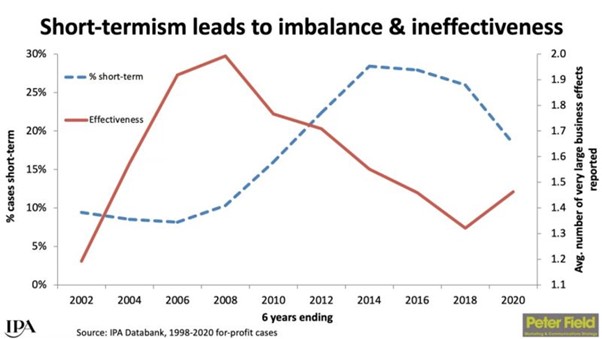
Dr. Martens champions sustainable fashion
Genix Nappa, a new material made of leather offcuts, aims to reduce waste

The long and the short of it is smart marketers need a mixture of long and short term strategies to thrive.

The short term versus long term argument rumbles on. 2021 is the year where marketers should chase a smart balance of the two for the best outcomes.
David Ogilvy famously said, “If it doesn’t sell, it isn’t creative.” But in this age of short-termism, advertising doesn’t have to be highly creative to sell as long as your data-targeting is accurate.
Les Binet argues that trying to activate in the short term and invest in the long term simultaneously can tend towards doing both things badly. The surface implication is that a binary choice must be made. So, when deep dive data offers a shorthand to successful brand activations, surely few marketers are immune to the temptation of a quick hit.
But what came before deep dive data? Advertising went on guts, creativity and taste, leading and reflecting culture. Ads often used humour and storytelling to land a message that appealed to the system 1 brain - the artistic, instinctual part that enjoys unpredictability and creativity.
In recent years, data has brought substance to the hunch or feeling: logic in irrefutable black and white. But instead of complementing creativity, the numbers have often supplanted the ‘creative hunch’. As Orlando Wood, author of Lemon argues, we’re now in a storytelling deficit, replaced by instructive and mechanistic advertising that is timely and relevant, but lacks entertaining or surprising features that can hold attention.
Back to Les Binet and that apparent binary choice between short and long term strategies (or logic versus guts). Here’s the thing: it’s a myth of modern day marketing that you have to choose. Plan effectively in the long term then activate efficiently along that timeline.
Southpaw Strategy Director Niki Macartney uses the analogy of needing both a short-term sugar hit and a baseline of carbs to keep a brand in good health.
Similarly, Mark Ritson terms it ‘bothism’. He explains: “If you know anything about marketing you will know that there is an enormous need for Bothism in our discipline right now. We are riven by so many contradictory and combative points of view, most of which would prove more powerful if wrangled into combination rather than opposition.”
The irony is that Binet and Field’s work never pitted one against the other. It was always ‘long and short’, with the emphasis on the ‘and’. But that point seems to have been lost in the thrill of argument.
Updated Field research shows equilibrium is beginning to emerge but achieving balance in 2021 might be trickier than we think.

As we emerge slowly from lockdown into an uncertain economic future, short term logical hits are going to feel more tempting than ever before. But here Orlando Wood argues that the pandemic itself has switched on our system 1 brains as we try to make sense of the events of the past year; accessing deeper levels of caring as we seek ways to look after each other. The result? “Flatness and abstraction in advertising will not cut it; depth and humanity are what’s needed.”
This applies particularly to those brands that have seen huge profits in the last 12 months, thanks to an agile ecommerce D2C model. There will be a need to invest in brand level comms that tell compelling stories, so they retain the customers they gained through lockdown. Watch brands like cult fashion label Reformation to see what they do next.
At the start of a new decade of marketing and brand building, stop choosing between logic or gut feeling. Instead make peace with long term creative magic and short-term data to deliver rock solid brand strength.
- System 1 and 2 thinking ultimately works together (our brains aren’t actually split into two, after all). But by focusing on appealing to the right brain, using the tools of consistency, humour and evolving storylines, brands can hit a home run.
- Remember it’s not a battle ground: you don’t have to choose short termism to the detriment of your long-term brand strategy. As per Binet and Field, the two should complement one another.
- Brands who thrived in lockdown did so because of saliency and consistency. Airbnb switched from heavy performance marketing to a brand approach that reminded consumers who they are and what they stand for (rather than trying to drive bookings).
Tom Poynter is currently the MD of Hakuhodo agency Southpaw. His experience spans 20 years in advertising and creative agencies holding leadership positions at Publicis, Digitas and Iris Worldwide.
Looks like you need to create a Creativebrief account to perform this action.
Create account Sign inLooks like you need to create a Creativebrief account to perform this action.
Create account Sign in